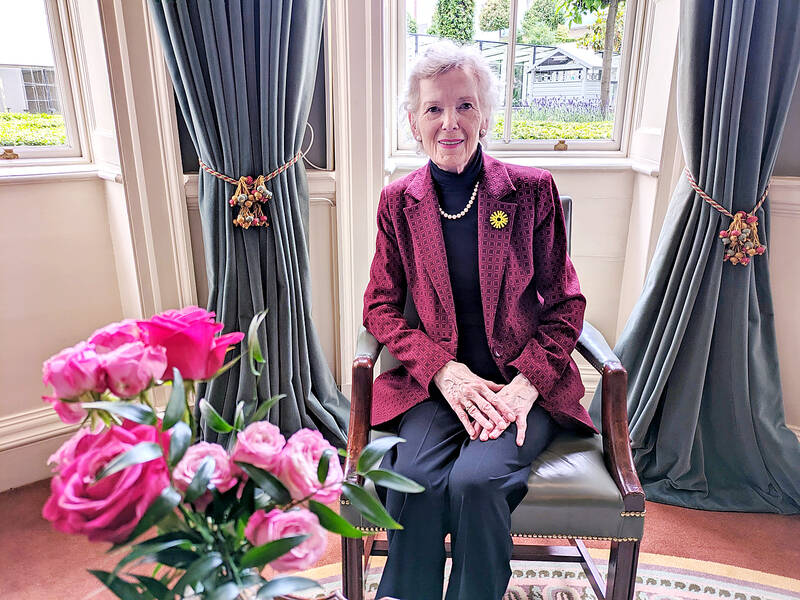Former Irish president Mary Robinson has been awarded the Tang Prize in Rule of Law for her decades-long dedication to global advocacy of such causes as climate justice and human rights, the award’s selection committee announced yesterday.
Robinson has demonstrated “an effective combination of legal acumen and practical solutions” in her “powerful advocacy” for climate justice, human rights, gender equality and poverty alleviation, said Chang Wen-chen (張文貞), chair of the Tang Prize Selection Committee for Rule of Law.
She “transformed the various positions in which she served to promote human rights, gender equality, the rights of the minority and most importantly, rule of law,” Chang, a National Taiwan University (NTU) law professor, said at a press conference in Taipei.

Photo: CNA
On the global stage, she has called for the private sector to shoulder responsibility for gender equality and climate justice, while advocating the need for women’s participation in climate-related decisionmaking, Chang said.
Robinson, 80, has since 2018 chaired The Elders, an international non-governmental organization founded by former South African president and anti-apartheid activist Nelson Mandela more than a decade ago.
Another member of the group, former Norwegian prime minister and former WHO director-general Gro Harlem Brundtland, is also a Tang Prize laureate, having received the Sustainable Development Award in 2014.
As the chairperson of the group, Robinson has spoken out against climate injustice, saying that protecting individuals and communities from the climate crisis should be an integral part of human rights promotion.
Robinson’s previous global roles include serving as the UN high commissioner for human rights from 1997 to 2002, and the UN special envoy on climate and other initiatives from 2014 to 2016.
Li Pei-jung (李佩蓉), a postdoctoral researcher at NTU’s College of Law, said that as UN high commissioner, Robinson consistently “urged the UN to take proactive actions to enhance human rights protections.”
She traveled globally to “strengthen human rights monitoring” and “drew global attention to the human rights and justice issues faced by the most disadvantaged groups,” Li said.
In addition, Robinson “bravely addressed sensitive issues,” Li said, citing her promotion of prisoners’ rights in the US military-controlled Guantanamo Bay detention camp in Cuba and her visit to Tibet in 1998 following Beijing’s crackdown on a peaceful demonstration there.
Before becoming a global voice, Robinson was president of the Republic of Ireland from 1990 to 1997, and throughout her time in office, she transformed the ceremonial role into a strong voice for human rights at home and abroad, Li said.
Robinson was the first foreign head of state to visit Somalia during the 1992 famine, and Rwanda after the genocide in 1994.
Born in 1944, Robinson started her career as a barrister in 1967 to represent minorities in court.
Robison was elected senator in 1969 at the age of 25, and in the following two decades, she introduced and supported bills on gender equality and pushed for reforms in a relatively conservative society, Li said.
Beyond serving in public positions for more than six decades, Robinson has continued to work in academia.
She has contributed to legal education since 1969 around the world as a law professor, and written extensively about human rights and climate justice.
She is an adjunct professor for climate justice at her alma mater, Trinity College Dublin.
The Tang Prize is a biennial award established in 2012 by Taiwanese entrepreneur Samuel Yin (尹衍樑), chairman of the Ruentex Group, to honor people who have made prominent contributions in four categories — sustainable development, biopharmaceutical science, sinology and rule of law.
A cash prize of NT$40 million (US$1.23 million) and an additional NT$10 million in research funding are allocated to each award category, the Tang Prize Foundation said.

POSITIVE DEVELOPMENT: Japan and the US are expected to hold in-depth discussions on Taiwan-related issues during the meeting next month, Japanese sources said The holding of a Japan-US leaders’ meeting ahead of US President Donald Trump’s visit to China is positive news for Taiwan, former Japan-Taiwan Exchange Association representative Hiroyasu Izumi said yesterday. After the Liberal Democratic Party’s landslide victory in Japan’s House of Representatives election, Japanese Prime Minister Sanae Takaichi is scheduled to visit the US next month, where she is to meet with Trump ahead of the US president’s planned visit to China from March 31 to April 2 for a meeting with Chinese President Xi Jinping (習近平). Japan and the US are expected to hold in-depth discussions on Taiwan-related issues during the

‘LIKE-MINDED PARTNER’: Tako van Popta said it would be inappropriate to delay signing the deal with Taiwan because of China, adding he would promote the issue Canadian senators have stressed Taiwan’s importance for international trade and expressed enthusiasm for ensuring the Taiwan-Canada trade cooperation framework agreement is implemented this year. Representative to Canada Harry Tseng (曾厚仁) in an interview with the Central News Agency (CNA) said he was increasingly uneasy about Ottawa’s delays in signing the agreement, especially as Ottawa has warmed toward Beijing. There are “no negotiations left. Not only [is it] initialed, we have three versions of the text ready: English, French and Mandarin,” Tseng said. “That tells you how close we are to the final signature.” Tseng said that he hoped Canadian Prime Minister Mark Carney

President William Lai (賴清德) yesterday bestowed one of Taiwan’s highest honors on Saint Vincent and the Grenadines (SVG) Ambassador Andrea Clare Bowman in recognition of her contributions to bilateral ties. “By conferring the Order of Brilliant Star with Grand Cordon on Ambassador Bowman today, I want to sincerely thank her, on behalf of the Taiwanese people, for her outstanding contribution to deepening diplomatic ties between Taiwan and SVG,” Lai said at a ceremony held at the Presidential Office in Taipei. He noted that Bowman became SVG’s first ambassador to Taiwan in 2019 and

A man walks past elementary school artworks at the Taipei Lantern Festival in Ximen District yesterday, the first day of the event. The festival is to run from 5pm to 10pm through March 15.